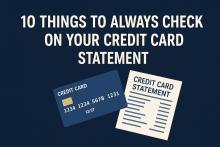10 Tips for Using Your Credit Card Wisely and Avoiding Debt

Getting your first credit card is an exciting step in your financial journey. It gives you the power to manage your finances, build your credit history, and open doors to financial opportunities. However, with that power comes responsibility. If you don’t manage your credit card wisely, you could end up in debt or damage your credit score. This guide will help you navigate the world of credit cards and set you up for long-term financial success.
1. Understand the Basics of Your Credit Card
Before you start using your credit card, it's crucial to understand how it works. Each credit card has its own terms, fees, and benefits. Here are the key things you should know:
- Credit Limit: This is the maximum amount you can charge on the card. Think of it as a loan that you need to repay.
- Interest Rates (APR): If you don't pay off your balance in full, you’ll be charged interest. The APR determines how much interest you’ll pay on your outstanding balance.
- Fees: Be aware of annual fees, late payment fees, and other charges that may apply to your card.
- Rewards and Benefits: Many credit cards offer rewards such as cashback, points, or travel perks. Make sure you understand how to earn and redeem these rewards.
2. Make Payments on Time
One of the most important things you can do with your credit card is to pay your bill on time. Late payments can result in hefty fees, a higher APR, and a negative impact on your credit score. To avoid these issues, set up reminders or automatic payments so you never miss a due date.
If you can’t pay the full balance, at least make the minimum payment. But, try to pay off the entire balance each month to avoid interest charges.
3. Pay More Than the Minimum
Paying the minimum balance will keep you in good standing, but it’s better to pay more than the minimum. If you only pay the minimum, it will take longer to pay off your balance, and you'll pay more in interest.
Ideally, try to pay off the full balance every month. If you can’t, pay as much as possible to reduce interest charges and pay off the balance faster.
4. Keep Your Credit Utilization Low
Credit utilization is the amount of credit you're using compared to your credit limit. It’s a major factor in determining your credit score. To maintain a good score, try to keep your utilization under 30%. For example, if your credit limit is ₹50,000, try not to use more than ₹15,000.
A low credit utilization rate shows that you're managing your credit responsibly, which can positively affect your credit score.
5. Monitor Your Statements Regularly
Reviewing your credit card statements is essential for tracking your spending and avoiding surprises. Each month, check your statements to:
- Track your spending: Ensure you’re sticking to your budget and not overspending.
- Spot errors: Mistakes or fraudulent charges can happen, so make sure everything on your statement is accurate.
- Avoid surprises: Knowing how much you owe will help you avoid late fees and interest charges.
Set aside some time each month to go through your statements and ensure that everything looks correct.
6. Avoid Unnecessary Debt
One of the biggest risks with credit cards is the temptation to overspend. It’s easy to think you have extra money to spend, but credit cards are not an excuse to live beyond your means. Only charge what you can afford to pay off in full each month.
If you’re struggling to control your spending, create a budget and stick to it. A credit card should be a tool to manage money, not a way to make impulse purchases.
7. Build a Positive Credit History
Your first credit card is an excellent opportunity to build your credit history. By making on-time payments and keeping your balance low, you'll establish a positive credit history, which can help you secure better loan rates and higher credit limits in the future.
A good credit score is a valuable asset, and managing your card responsibly will ensure you have a solid credit foundation.
8. Know When to Ask for a Credit Limit Increase
After you've built a history of responsible credit use, you might be offered a credit limit increase. This can be beneficial because it can lower your credit utilization rate, which could improve your credit score. However, don’t treat this as an excuse to spend more.
If you accept the increase, make sure you continue to use your card wisely and avoid accumulating unnecessary debt.
9. Watch Out for Credit Card Traps
Credit cards can come with enticing offers, but it's essential to be cautious. Watch out for:
- High fees: Some credit cards charge high annual fees or other hidden costs.
- Introductory rates: Some cards offer 0% interest for an introductory period, but the APR could increase significantly afterward.
- Too many applications: Applying for too many credit cards in a short time can hurt your credit score and lead to unnecessary fees.
Always read the terms and conditions carefully before applying for or using a credit card.
10. Know How to Handle Credit Card Debt
If you find yourself with credit card debt, it's essential to address it as soon as possible. Start by paying off high-interest debt first. You can also consider consolidating your debt or seeking help from a financial advisor.
Ignoring the problem will only make it worse. Take action to reduce your debt and get back on track with your payments.
Conclusion
Managing your first credit card responsibly is an important step toward building a healthy financial future. By making on-time payments, keeping your balance low, and using your card wisely, you'll be able to avoid common pitfalls and set yourself up for long-term success.
Remember, a credit card is a financial tool designed to help you manage your money. If used responsibly, it can help you build a strong credit history and unlock new financial opportunities. Stay informed, stay disciplined, and you’ll be well on your way to financial success.
Additional Tips:
- Apply for the right credit card: When applying for your first card, make sure you choose one that fits your financial needs and spending habits.
- Track your rewards: Take advantage of cashback, rewards points, or other perks offered by your card.
- Stay financially mature: Consistently assess your income, spending, and ability to pay your bills to maintain a responsible credit card habit.




Leave a Reply